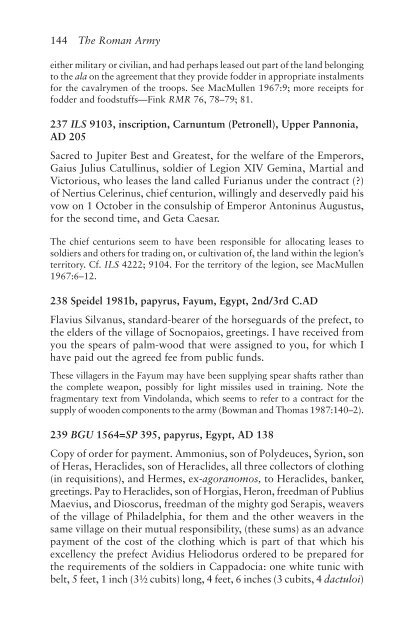The Roman Army, 31 BC–AD 337: A Sourcebook
The Roman Army, 31 BC–AD 337: A Sourcebook
The Roman Army, 31 BC–AD 337: A Sourcebook
You also want an ePaper? Increase the reach of your titles
YUMPU automatically turns print PDFs into web optimized ePapers that Google loves.
144 <strong>The</strong> <strong>Roman</strong> <strong>Army</strong><br />
either military or civilian, and had perhaps leased out part of the land belonging<br />
to the ala on the agreement that they provide fodder in appropriate instalments<br />
for the cavalrymen of the troops. See MacMullen 1967:9; more receipts for<br />
fodder and foodstuffs—Fink RMR 76, 78–79; 81.<br />
237 ILS 9103, inscription, Carnuntum (Petronell), Upper Pannonia,<br />
AD 205<br />
Sacred to Jupiter Best and Greatest, for the welfare of the Emperors,<br />
Gaius Julius Catullinus, soldier of Legion XIV Gemina, Martial and<br />
Victorious, who leases the land called Furianus under the contract (?)<br />
of Nertius Celerinus, chief centurion, willingly and deservedly paid his<br />
vow on 1 October in the consulship of Emperor Antoninus Augustus,<br />
for the second time, and Geta Caesar.<br />
<strong>The</strong> chief centurions seem to have been responsible for allocating leases to<br />
soldiers and others for trading on, or cultivation of, the land within the legion’s<br />
territory. Cf. ILS 4222; 9104. For the territory of the legion, see MacMullen<br />
1967:6–12.<br />
238 Speidel 1981b, papyrus, Fayum, Egypt, 2nd/3rd C.AD<br />
Flavius Silvanus, standard-bearer of the horseguards of the prefect, to<br />
the elders of the village of Socnopaios, greetings. I have received from<br />
you the spears of palm-wood that were assigned to you, for which I<br />
have paid out the agreed fee from public funds.<br />
<strong>The</strong>se villagers in the Fayum may have been supplying spear shafts rather than<br />
the complete weapon, possibly for light missiles used in training. Note the<br />
fragmentary text from Vindolanda, which seems to refer to a contract for the<br />
supply of wooden components to the army (Bowman and Thomas 1987:140–2).<br />
239 BGU 1564=SP 395, papyrus, Egypt, AD 138<br />
Copy of order for payment. Ammonius, son of Polydeuces, Syrion, son<br />
of Heras, Heraclides, son of Heraclides, all three collectors of clothing<br />
(in requisitions), and Hermes, ex-agoranomos, to Heraclides, banker,<br />
greetings. Pay to Heraclides, son of Horgias, Heron, freedman of Publius<br />
Maevius, and Dioscorus, freedman of the mighty god Serapis, weavers<br />
of the village of Philadelphia, for them and the other weavers in the<br />
same village on their mutual responsibility, (these sums) as an advance<br />
payment of the cost of the clothing which is part of that which his<br />
excellency the prefect Avidius Heliodorus ordered to be prepared for<br />
the requirements of the soldiers in Cappadocia: one white tunic with<br />
belt, 5 feet, 1 inch (3½ cubits) long, 4 feet, 6 inches (3 cubits, 4 dactuloi)



